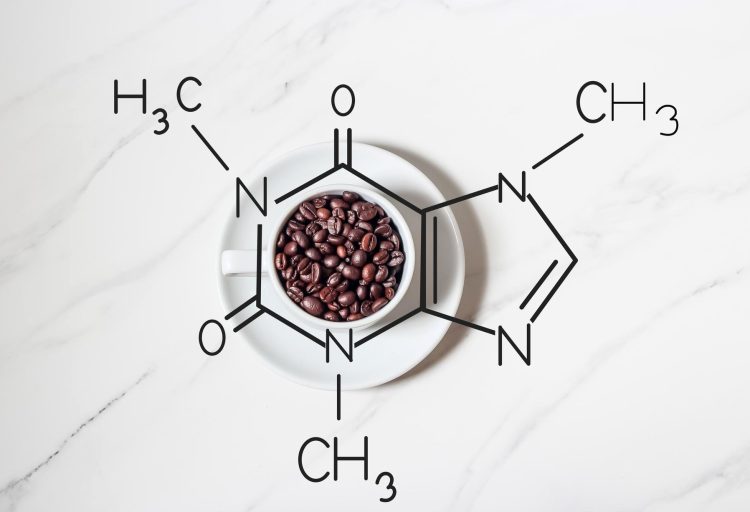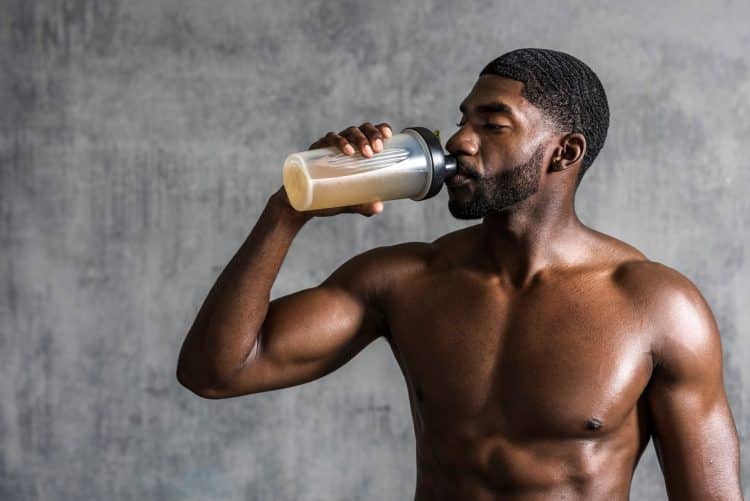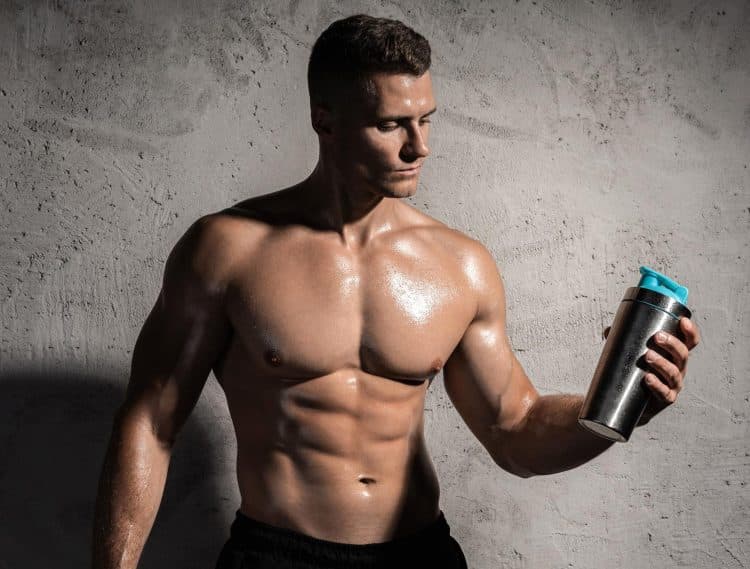I love the tingling sensation (an effect of an ingredient called beta-alanine) I get after drinking my favorite pre-workout supplement.
However, some people cannot stand the feeling of ants crawling down their bodies and would rather have a hot cup of coffee before a training session.
Strength sports like CrossFit, bodybuilding, strongman, and Olympic weightlifting have varying training styles. However, all serious athletes understand the vital role of energy supplements (coffee or pre-workout) in achieving peak performance.
Make no mistake, pre-training energy supplements aren’t some placebos. There is solid research backing their effectiveness.
According to a study published in the Journal of the International Society of Sports Nutrition, high-energy liquid supplements consumed pre-exercise have been shown to significantly improve upper-body muscular endurance, indicating their utility in resistance training. (1)
In the quest to uncover the most effective pre-training energy supplement, I poured 50 hours into researching different coffee and pre-workout supplements, ingredients, and results. I’ll share everything I learned in this article.
Understanding Caffeine’s Role in Exercise Performance
Whether you’re a coffee aficionado or a pre-workout enthusiast, you can’t ignore caffeine. It is the ingredient that does most of the heavy lifting in both energy supplements.
Although some pre-workout supplements are stimulant-free (zero caffeine), they make up for it by including other potent energy-boosting ingredients.
On the other hand, decaffeinated coffee is almost ineffective for boosting training performance.
Boosting Energy Levels, Focus, and Athletic Performance
No two days are the same. You might be super pumped to train on one day and might dread going to the gym the very next day.
While you might get a good workout on the first day, you will need something to charge your batteries on the second. And let’s be honest, the second kind of day is more common.
One less-discussed advantage of caffeine is its ability to enhance focus and concentration. Think of caffeine as a spotlight for your brain. It can sharpen your concentration and help you stay in the zone during every rep and set.
The Caffeine Showdown: Coffee vs. Pre-Workout Supplements
Most have a favorite coffee that they turn to for their daily caffeine fix. However, unlike most pre-workout supplements that have their caffeine content listed on the label, most coffee brands don’t give out the exact details of the caffeine content in their products.
The lack of nutrition information makes it challenging to compare your beloved coffee with top-of-the-line pre-workout supplements designed explicitly for gym-goers.
Coffee lovers will hate me for saying this, but most coffee brands don’t have enough caffeine to power a high-intensity training session.
A standard cup of joe contains anywhere from 80 to 100 milligrams of caffeine, depending on the brew.
On the other hand, pre-workout supplements can pack a more concentrated caffeine punch, often delivering 200 milligrams or more per serving.
Some of the most popular pre-workout supplements can contain around 400 milligrams of caffeine per serving. Although not optimal (or ideal), they deliver quite a jolt!
The FDA has cited 400 milligrams a day as the recommended limit for healthy adults. That’s about four or five cups of brewed coffee. (2)
Optimal Caffeine Dosages for Different Scenarios
The ideal caffeine dosage can vary for each individual depending on multiple factors, including body weight, workout intensity, and caffeine tolerance.
For lighter individuals, a lower dose of caffeine is sufficient to enhance performance. Conversely, heavier individuals might require a slightly higher dosage for the same effects.
Furthermore, daily use of a pre-workout supplement could build tolerance, potentially requiring an increased dosage over time to maintain its initial energy-boosting effects.
I have found that aiming for about 3-6 milligrams of caffeine per kilogram of body weight works the best for me and my clients for optimal performance-enhancing results.
If you are gearing up for a high-intensity session, you can aim for 3mg of caffeine per kilogram of body weight, whereas you could go up to 6mg during a high-intensity session.
According to this, a 170-pound individual can have 232mg of caffeine for a low-intensity steady-state cardio session and 400mg for a high-intensity workout. However, it’s crucial to cap caffeine intake at 400mg regardless of the workout intensity.
I have most of my clients cruise around between 250-300mg of caffeine, with a few days off in between. This ensures that they don’t build up a tolerance.
On days where I intend to push the envelope a little further, I take around 350-400mg of caffeine.
Read also: Caffeine Limits For Athletes
Coffee: A Natural Pre-Workout Beverage
When it comes to boosting training performance, coffee is a natural powerhouse.
Its secret lies in caffeine, a natural stimulant found in coffee beans. Caffeine’s ability to boost alertness and energy levels has made it a favorite among athletes.
However, not all coffee is created equal. A cup of black coffee, rich in caffeine content, is perfect for kickstarting your training session.
It’s a tried-and-true choice for people seeking that extra edge in the gym without breaking the bank on expensive pre-training powders.
The Additive Dilemma
While black coffee reigns supreme for its caffeine punch, adding milk might not be the best choice for folks trying to boost their workout performance.
A study published in the Journal of Agricultural and Food Chemistry found that adding milk to coffee influences the bioaccessibility of chlorogenic acids (CGAs), caffeine-related compounds. This suggests that milk could alter the bioavailability of certain components in caffeinated beverages, slowing down its effects. (3)
Similarly, flavored creamers can dilute the caffeine concentration and hamper its effectiveness.
Sweeteners might provide a quick energy boost because of the simple sugars, but they can lead to a sugar crash right after the workout.
Balancing caffeine and additives is like walking a tightrope. You must strike the perfect balance between personal preference and performance objectives to get the best results.
I recommend sticking to a regular cup of black coffee to get the best performance-boosting results.
Beyond coffee’s workout performance-boosting capabilities, it also has several health-boosting effects.
Research suggests that the antioxidants in coffee may help protect cells from oxidative stress, reducing the risk of chronic diseases. It can also boost mental health and lower the risk of certain cancers. (4, 5)
Pre-Workout Supplements: A Tailored Boost
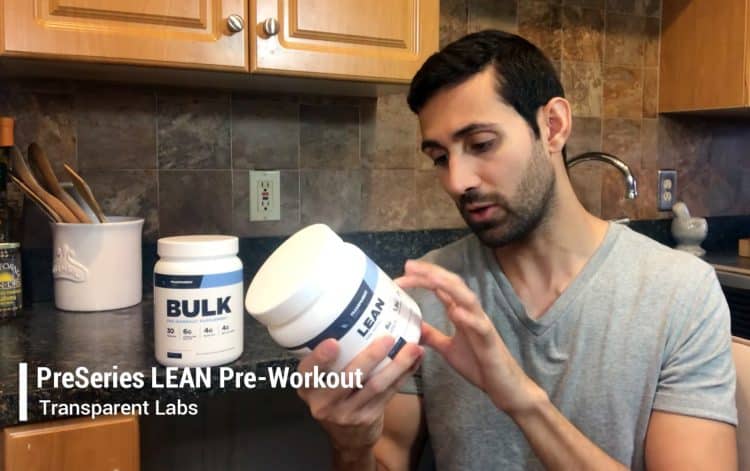
As a 16-year gym veteran, I have tried almost all pre-workout supplements under the sun.
A pre-workout supplement’s effectiveness depends on its ingredients and their quantities.
Here are some of the most popular ingredients in a pre-workout supplement:
Caffeine
Caffeine is arguably the most popular pre-workout supplement. Since we have discussed caffeine in detail in the previous section, I won’t elaborate on it again.
Sports nutrition companies use different forms of caffeine in their formulas. Popular varieties include caffeine citrate, di-caffeine malate, and a caffeine L-theanine blend. Among these, caffeine anhydrous is the most commonly used form in pre-workout supplements.
Caffeine anhydrous is a pure, white powder that’s more concentrated and stronger than regular caffeine. It’s made by removing water from regular caffeine.
Beta-Alanine
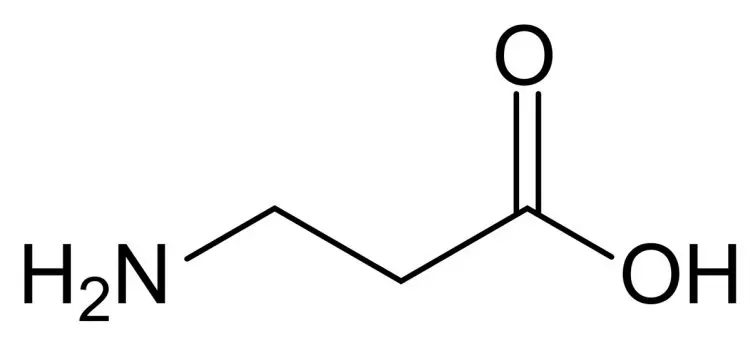
The tingling sensation I talked about at the opening of the article is due to an amino acid called beta-alanine.
Contrary to what most people think, beta-alanine’s effects are not limited to the tingling sensation. It helps buffer lactic acid buildup during intense exercise, which can delay muscle fatigue and improve endurance.
Pro Tip: The tingling sensation, commonly referred to as “paresthesia,” is a sign that beta-alanine in the supplement is doing its job.
Creatine
Creatine is one of the most tested and safest supplement ingredients on the market. It boosts your body’s ATP production, the primary energy currency of your cells, allowing you to lift heavier and for longer.
BCAAs
Branched-chain amino acids, or BCAAs as they are popularly known, are very effective additions to a pre-workout supplement. The leucine, isoleucine, and valine in a BCAA supplement help kickstart the recovery process during the workout itself.
BCAAs help reduce muscle soreness, prevent catabolism during intense workouts, and ensure you bounce back quicker for your next training session.
Some other popular pre-workout ingredients include L-citrulline, L-tyrosine, arginine, citrulline malate, taurine, glutamine, ashwagandha, electrolytes, and essential vitamins and minerals.
Many companies offer various pre-workout supplements that contain different ingredients and have different effects.
The Problem with Some Pre-Workout Supplements
One of the most significant drawbacks of some pre-workout supplements is that many companies use a proprietary blend label or trademarked ingredient formulations to hide their ingredient dosages.
Some companies incorporate minimal amounts of certain ingredients merely to include them in their product lists, though these ingredients have negligible or no impact on performance enhancement.
I highly recommend buying supplements that are third-party tested and verified to ensure the dosing and effectiveness of the ingredients.
Are you on a tight budget and don’t want to shed money on a pre-workout supplement? Read our detailed guide on how to make your own pre-workout supplement at home that is as effective as the commercial ones but for a fraction of the cost.
Who Should Use Coffee and Pre-Workout?
The choice between a cup of coffee and a scoop of pre-workout shouldn’t be left to personal preferences, at least if you are trying to optimize performance.
Your pick should be based on which supplement helps you achieve your fitness goals. Here is how training goals can influence your choice between coffee and a pre-workout supplement:
Strength Training
Coffee can be a trusty sidekick of bodybuilders, powerlifters, and strongman athletes. The caffeine in the coffee can boost alertness and energy levels. It can help you squeeze out extra reps in your workouts and push your muscles to the limit.
On the flip side, pre-workout supplements can help unlock unprecedented performance. These supplements comprise ingredients tailored to boost your strength and power levels.
Strength sports athletes should look for a pre-workout supplement with caffeine, beta-alanine, creatine, BCAAs, nitric oxide boosters, and citruline malate.
Endurance
Endurance athletes have significantly different needs than strength sports athletes. Caffeine can stimulate the release of adrenaline during a long run, bike ride, or while swimming. Adrenaline can improve endurance by increasing the mobilization of fatty acids, providing a sustained energy source.
Pre-workout supplements designed for endurance involve a higher dose of beta-alanine, BCAAs, electrolytes, and nootropics like L-tyrosine (as N-acetyl L-tyrosine) and L-theanine. These ingredients will help you go strong for longer.
Nitric oxide boosters can improve blood flow and oxygen delivery to the muscles, delaying lactic acid buildup in endurance activities.
Weight Loss
Coffee and pre-workout supplements can significantly impact your results.
Caffeine can act as a metabolism booster, increasing calorie expenditure. Coffee can also boost metabolic rate, which helps you burn calories throughout the day, even when you are not physically active. (6)
On the other hand, some pre-workout supplements specifically cater to weight loss. These supps contain ingredients like green tea extract, which are popular for their fat-burning properties.
Some ingredients in pre-workout supplements can also help suppress appetite, which can aid in controlling cravings and sticking to a calorie deficit.
Personal Experience — Coffee vs. Pre-Workout
I have been training for a very long time.
For how long, you ask?
Much before CrossFit was a global phenomenon.
My training has evolved over the years as I have switched between weight loss, endurance, and strength training. I have tried different types of coffees and pre-workout supplements to fuel my training.
After all the research and experiments, I now have a system where I simultaneously include coffee and pre-workouts in my routine.
I use coffee as my pre-training drink on routine training days and reserve the pre-workout supplement (Transparent Labs Bulk) for days when I intend to push myself harder and want to aim for a personal best.
This approach ensures that I don’t build a pre-workout tolerance and can get the kick I need to crush a workout without overshooting the 400mg caffeine limit.
I encourage you to try my 3-6 milligrams of caffeine per kilogram of body weight recommendation.
That said, you must consult your healthcare provider before starting a new training or diet regimen, especially if you are dealing with health issues.
Side Effects and Considerations — Coffee vs. Pre-Workout
Until now, we have discussed all the good things about coffee and pre-workout. However, both have their fair share of drawbacks that you must know about.
Potential Side Effects
Here are some potential coffee and pree-workout side-effects:
Coffee
Coffee, in its pure form, can lead to jitteriness, anxiety, and heart palpitations if consumed in excess.
Increase the caffeine dosage gradually to avoid the potential side effects. Furthermore, be mindful when trying a new coffee brand. Some brands tend to spike the caffeine content of their products to deliver a more potent energy kick. However, it can disrupt sleep patterns, leaving you fatigued instead of revitalized.
Pre-Workout Supplements
Pre-training supplements are a concoction of many different ingredients, and each can make or break your experience.
People sensitive to a particular ingredient should always read the labels before purchasing a supplement. Steer clear of supplements with proprietary blends to minimize the risk of side effects.
Safe Consumption Guidelines
Here are a few tips to ensure safety while using a pre-workout or coffee supplement:
Coffee
Consume 1-2 cups (8-16 ounces) of coffee 30-60 minutes before your workout. Since each cup of coffee usually has a maximum of 100mg of caffeine, it should be enough to energize you for your training session.
I recommend going with black coffee and avoiding any additives to get the best bang for the buck.
Pre-Workout Supplements
Read the labels carefully and ensure it has no ingredients that you are allergic to. Start with small doses to assess your tolerance. If a pre-workout supplement mentions one scoop as the recommended dosage on the label, beginners should start with half a scoop.
Whether you opt for coffee or pre-workout supplements, avoid taking them too close to bedtime to avoid sleep disruption.
Cost Analysis: Coffee vs. Pre-Workout Supplements
The cost of energy supplements, especially pre-workouts, can add up quickly.
Here are the things you must consider while choosing between coffee and pre-workout supplements:
Casual Gym-Goer
Folks who hit the gym a few times a week and are mainly looking to train to maintain overall health and well-being will be better off opting for a cost-effective energy supplement. Coffee, a staple in many households, is an attractive option.
Most hobbyist exercisers cannot justify the price tag of a pre-workout supplement. A cup of coffee from your favorite local coffee shop or the one you brew at home will get you your caffeine fix.
Serious Athlete
People who train five to six days a week and are dedicated to building muscle, losing weight, improving their endurance, and achieving peak performance can take a pre-workout supplement to get that extra edge.
Furthermore, professional athletes who want to go the extra mile can benefit from the additional ingredients in a pre-workout supplement. These supplements are formulated with specific ingredients to optimize energy, endurance, and focus.
While pro athletes can get their morning caffeine fix from a cup of coffee, it won’t be enough to power their intense workouts. Investing in a pre-workout supplement can be an excellent decision for athletes serious about achieving peak performance.
FAQs
Can I make my own pre-workout supplement at home?
Pre-workout supplements can help boost your performance significantly; however, they can burn a hole in your wallet. You can get all the pre-workout ingredients you need to make a potent supplement on Amazon. Use this convenient guide to make your own pre-workout supplement.
When should I drink coffee or a pre-workout supplement?
Whether you choose coffee or a pre-workout supplement as your energy fix, drink it 30-45 minutes before your training session. It gives your body enough time to break down the ingredients and get the best results.
You’ll also gain valuable insights into the optimal timing for consuming your pre-workout drink by experimenting with different timing intervals. Stick to the one that works the best for you.
I don’t get the same kick from my pre-workout supplement as before. Why is that?
If you take the same amount of pre-workout supplement (or even coffee, for that matter) every day, your body will build a tolerance for it. You will then have to slightly increase your dosage to get the same effect.
I recommend lowering the dose of the pre-supplement on days when you don’t intend to train as hard. This will ensure your body doesn’t get used to the supp. Furthermore, you can cycle the supplement weekly to ensure maximum potency.
Conclusion
Whether you’re into having coffee or a pre-workout supplement before a training session, using an energy supplement can significantly boost your training performance.
Coffee and pre-workout supplements can boost energy, sharpen focus, and give you that extra push to reach your training goals. The choice between coffee and a pre-workout supplement will depend on your training goals and budget. Pick the one that makes the most sense for you now; you cannot go wrong with either.
If you have any doubts or need help choosing the right pre-workout supplement for your goals, feel free to leave a comment in the section below, and I’ll be happy to help.
References
Fitness Volt is committed to providing our readers with science-based information. We use only credible and peer-reviewed sources to support the information we share in our articles.
- Dawes J, Ocker LB, Temple DR, Spaniol F, Murray AM, Bonnette R. Effect of a pre-exercise energy drink (Redline®) on upper-body muscular endurance performance. J Int Soc Sports Nutr. 2011;8(Suppl 1):P18. Published 2011 Nov 7. doi:10.1186/1550-2783-8-S1-P18
- U.S. Food and Drug Administration. Spilling the Beans: How Much Caffeine is Too Much? U.S. Food and Drug Administration1. Published December 12, 2018. Accessed January 13, 2024.
- Tagliazucchi, D., Helal, A., Verzelloni, E., & Conte, A. (2012). The type and concentration of milk increase the in vitro bioaccessibility of coffee chlorogenic acids. Journal of agricultural and food chemistry, 60(44), 11056–11064. https://doi.org/10.1021/jf302694a
- Ribeiro, M., Alvarenga, L., Cardozo, L. F. M. F., Kemp, J. A., Lima, L. S., Almeida, J. S., Leal, V. O., Stenvinkel, P., Shiels, P. G., & Mafra, D. (2024). The magical smell and taste: Can coffee be good to patients with cardiometabolic disease? Critical reviews in food science and nutrition, 64(2), 562–583. https://doi.org/10.1080/10408398.2022.2106938
- Butt, M. S., & Sultan, M. T. (2011). Coffee and its consumption: benefits and risks. Critical reviews in food science and nutrition, 51(4), 363–373. https://doi.org/10.1080/10408390903586412
- Acheson, K. J., Zahorska-Markiewicz, B., Pittet, P., Anantharaman, K., & Jéquier, E. (1980). Caffeine and coffee: their influence on metabolic rate and substrate utilization in normal weight and obese individuals. The American journal of clinical nutrition, 33(5), 989–997. https://doi.org/10.1093/ajcn/33.5.989



